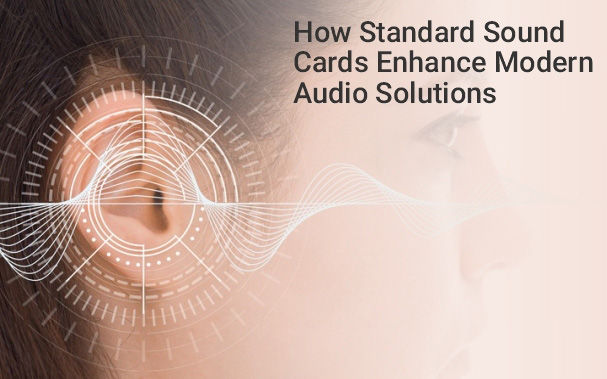How Standard Sound Cards Enhance Modern Audio Solutions
- Audio Driver Updater
- Sep 13, 2024
- 5 min read
Audio quality has seen remarkable advancements in the ever-evolving world of personal computing. From basic PC speakers to today's sophisticated audio setups, the quest for high-fidelity sound remains a key concern. While modern motherboards often feature integrated audio solutions, dedicated sound cards stand out for superior performance. This article explores how standard sound cards enhance modern audio driver updater, focusing on their historical evolution, advantages over integrated audio, and tips for choosing the right one for your needs.

Evolution of Sound Cards
Sound cards have come a long way since their inception in the early 1980s. Originally introduced as expansion cards for personal computers, these devices were designed primarily to play simple sound effects and music. As technology advanced, sound cards evolved substantially, providing improved audio quality, support for surround sound, and a variety of other capabilities such as digital audio outputs.
The early sound cards were revolutionary, making it possible to enjoy richer audio experiences than possible with the basic beeps PCs. Over the decades, innovations such as digital-to-analog converters (DACs), advanced signal processing, and higher sampling rates have transformed sound cards from basic audio enhancers to sophisticated audio solutions capable of delivering near-studio-quality sound.
Advantages of Dedicated Sound Cards
Dedicated sound cards offer several distinct advantages over integrated audio solutions. Here’s how they enhance modern audio experiences:
Superior Audio Quality
One of the most significant benefits of a dedicated sound card is its potential for vastly improved audio quality. High-end sound cards often feature premium components, including advanced audio DACs and operational amplifiers (op-amps), contributing to cleaner, more detailed, and dynamic sound. These components allow for a wider frequency response, lower distortion, and an improved signal-to-noise ratio.
When comparing sound card options, look for those with high-resolution audio capabilities. They can provide a more immersive and accurate sound experience, whether you're listening to music, watching movies, or playing games. This superior audio quality is especially noticeable in high-fidelity recordings and when using high-end headphones or speakers.
Enhanced Features
Dedicated sound cards frequently come with a range of features that can significantly enhance your listening experience
Surround Sound:
Many modern sound cards support advanced surround sound formats such as Dolby Digital and DTS. This capability allows for a more immersive audio experience, making it feel as though you’re in the center of the action, whether you're gaming or watching a movie.
Headphone Amplifiers:
Built-in headphone amplifiers can drive high-impedance headphones with ease. This feature is particularly beneficial for audiophiles and gamers who require precise audio reproduction and greater volume without sacrificing sound quality.
Customizable Equalization:
Sound cards often include software that allows users to adjust the sound signature to their liking. This customizable equalization enables you to tailor the audio output to suit your personal preferences or specific audio content.
Digital Outputs:
For those with high-end home theater systems or external audio equipment, digital outputs like optical or coaxial connections are essential. They ensure the highest quality audio transfer from the sound card to external devices, bypassing potential interference from analog connections.
Isolation from Electromagnetic Interference (EMI)
Dedicated sound cards are often designed with shielding to protect against electromagnetic interference (EMI). This is crucial in environments with high levels of electromagnetic activity or for users who are particularly sensitive to noise. EMI can degrade audio quality by introducing unwanted noise or distortion, so having a sound card that is well-shielded can ensure a cleaner and more accurate sound.
Upgradability
Unlike integrated audio solutions, which are built into the motherboard and thus harder to upgrade, dedicated sound cards offer the advantage of upgradability. If your audio needs change or if you want to enhance your system’s capabilities, you can easily replace or upgrade your sound card without having to replace the entire motherboard. This flexibility allows you to keep your audio system up-to-date with the latest advancements and features.
Choosing the Right Sound Card
Selecting the right sound card can be a crucial decision, especially if you want to maximize your audio experience. Here are some key factors to consider:
Purpose
Identify the primary use case for the sound card. Are you a gamer looking for immersive surround sound? A music producer needing precise audio for mixing and mastering? Or perhaps you’re a movie enthusiast seeking cinematic audio experiences? Understanding your needs will help you choose a sound card with the appropriate features and performance characteristics.
Connectivity
Consider the types of audio devices you plan to connect to the sound card. Ensure that the card has the necessary inputs and outputs to accommodate your speakers, headphones, microphones, and any other peripherals. If you require specific connections like MIDI ports or additional audio jacks, make sure the sound card you choose supports them.
Compatibility
Ensure that the sound card is compatible with your motherboard and operating system. Most modern sound cards work with a wide range of systems, but it's always wise to check compatibility to avoid any potential issues during installation.
Budget
Sound cards vary widely in price, from budget-friendly models to high-end options with extensive features. Set a budget and explore options within your range. While higher-priced cards often offer better performance and more features, there are also excellent mid-range and budget options available that can provide substantial improvements over integrated audio solutions.
Role of Driver Update Software
An often-overlooked aspect of maintaining optimal audio performance is keeping your sound card's drivers up to date. This is where driver update software comes into play. Regularly updating your drivers can ensure that your sound card operates efficiently and can resolve potential issues related to compatibility and performance.
Audio driver updaters are specialized tools designed to help you keep your sound card’s drivers current. These tools can automatically check for new driver versions, download updates, and install them, ensuring that you benefit from the latest improvements and fixes.
For users who are not comfortable manually updating drivers, using an install driver updater tool can simplify the process. These tools can save time and ensure that you’re always running the latest drivers, which can be crucial for maintaining the best audio performance.
When searching for a solution, consider looking for the best audio card driver updater that meets your needs. High-quality driver update software can help prevent common issues and ensure that your sound card delivers optimal performance.
Conclusion
Despite significant advancements in integrated audio solutions, dedicated sound cards continue to offer a compelling advantage for those seeking superior audio quality and versatility. By investing in a high-quality sound card and keeping its drivers updated with the help of specialized audio driver updater tools, you can significantly enhance your audio experience.
Whether you're a casual listener, a dedicated gamer, or a professional audio engineer, the right sound card can provide a substantial boost to your audio setup. As technology continues to evolve, dedicated sound cards will remain a vital component in achieving the best possible audio quality, delivering immersive soundscapes, and ensuring that your audio experience meets the highest standards.



Comments